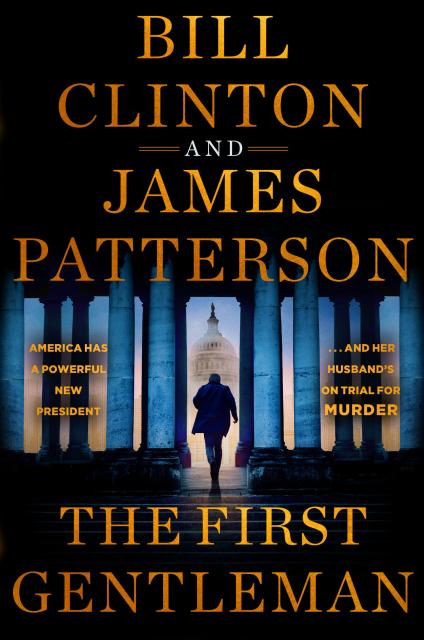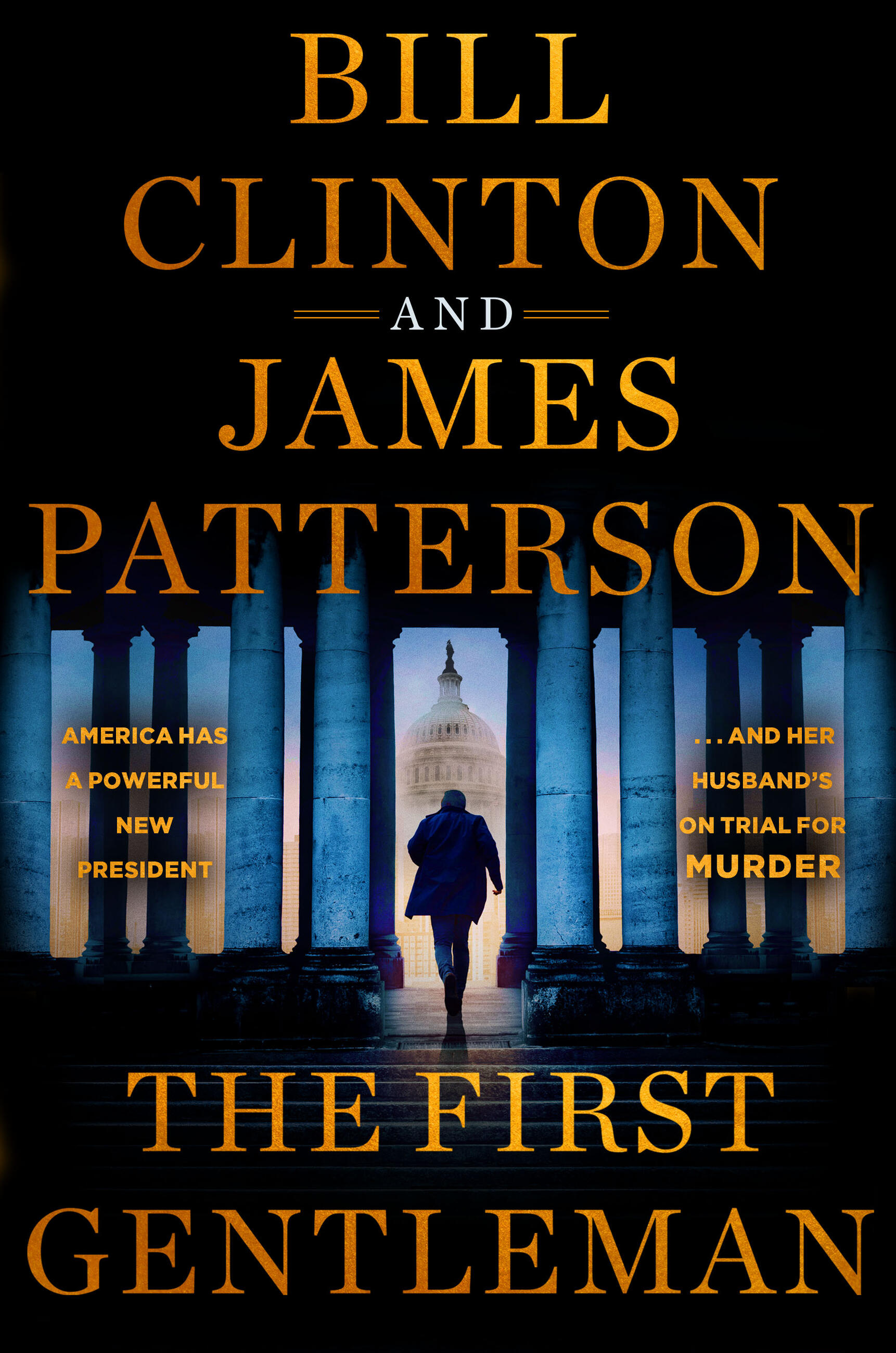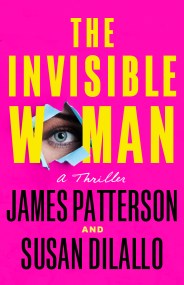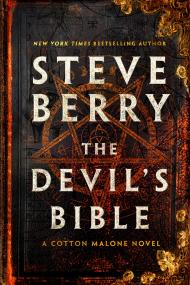The First Gentleman
A Thriller
Contributors
By Bill Clinton
Formats and Prices
- On Sale
- Jun 2, 2025
- Page Count
- 480 pages
- Publisher
- Little, Brown and Company
- ISBN-13
- 9780316565103
Price
$32.00Price
$42.00 CADFormat
Format:
Buy from Other Retailers:
From the world’s #1 bestselling author and former president of the United States, America has a powerful new president … and her husband’s on trial for murder.
“Bill Clinton reveals key White House details in murderous new political thriller … It’s a twisty thriller with plenty of inside jobs, political sabotage and many, many deaths.” —USA Today
“Definitely a page-turner.” —Denver Post
Clinton and Patterson are back. And they’re better than ever. The President of the United States is up for reelection. Her husband is on trial for murder.
Is the First Gentleman a killer? A pair of brilliant investigative journalists set out to answer that burning question about the NFL star-turned-political spouse.
The First Gentleman has all the twists and turns, and the authenticity one expects from the #1 bestselling authors of The President Is Missing and The President’s Daughter.
-
“Bill Clinton reveals key White House details in murderous new political thriller… It's a twisty thriller with plenty of inside jobs, political sabotage and many, many deaths.”USA Today
-
"If fast-paced, thrilling stories are your thing, you'll love this one."Real Simple
What's Inside
Prologue
Chapter 1
Chapter 2
Chapter 3
Chapter 4
•••
PROLOGUE
President Wright Administration
Year Three: September
•••
1
Brentwood, New Hampshire
Cole Wright is sitting in the rear seat of a black up-armored Chevy Suburban, one of three in a convoy speeding its way down Route 125 in the Seacoast Region of New Hampshire.
Two dark green state police cruisers, lights flashing, are leading this no-frills motorcade, scaled down for the occasion. The presidential limousine — the Beast — is back at the airport, along with the Secret Service counterassault team, support personnel, news media vans, and a fully equipped ambulance.
Three years after the election, Cole still gets pumped from seeing traffic part like magic, even though he’s well aware that it’s for the convenience and safety of the woman sitting beside him — his wife, Madeline Parson Wright, the president of the United States.
He’s just the First Gentleman.
A light drizzle spatters against the bulletproof windows. The agent accelerates to seventy along the two-lane highway.
“Two minutes out,” says Burton Pearce, the president’s chief of staff. Pearce perches in a rear-facing jump seat across from the First Couple. He’s pale and serious, wearing one of his many identical gray suits. “The Gray Ghost,” staffers call him. The president nods without looking up.
Cole glances over to see the confidential stamps on the pages Maddy is reading as the convoy hums along. He knows those pages represent the biggest political gamble of her administration — of any administration. She should be in the Oval Office working the phones and twisting arms, but instead she’s here with him. A powerful personal show of support.
Maddy puts her briefing packet aside. Cole takes her hand and squeezes it.
She squeezes back. “Don’t worry,” she says. “After all we’ve been through together, we can get through this too.”
The Suburban slows down to make a hard turn behind the police escort. Now the convoy is moving at just forty miles per hour. On both sides of the route, locals hold up crude hand-painted placards.
WE BELIEVE IN YOU, COLE!
STAY STRONG, COLE!
KEEP MOVING, COLE!
He looks out through the tinted side window. Almost game time. He can feel his muscles twitching, his focus narrowing, just like in his days as a tight end for New England — before the blown knee forced him out. He remembers how the tension in the Patriots locker room would build and build almost to the breaking point until the team ran out into the light, and when the cheers of the crowd washed over him, he’d think, Yeah, we’re okay. We’ve got this.
But today?
Today he’s not so sure.
The redbrick facade of the Rockingham County courthouse comes into view. The road is lined with police barricades holding back hundreds — maybe thousands— of onlookers. Up here, some of the signs have a different tone.
SCUM!
MONSTER!
JUSTICE FOR SUZANNE!
“Don’t worry about these people,” says Maddy. “They don’t know what they’re talking about.”
“I don’t care about the people on the road,” says Cole. “I’m worried about the twelve people waiting for me inside.”
As the Suburban slows to a crawl, two women jump out in front and unspool a long banner.
CONVICT COLE WRIGHT! SEND HIM STRAIGHT TO HELL!
Thanks for the kind wishes, Cole thinks.
•••
2
A thousand demonstrators, media people, and curious locals are crowded into the rain-slick parking lot. The convoy is passing through the tall evergreens flanking the pavement leading up to the courthouse when I realize I left my umbrella in my car. Too late.
Rockingham County has never drawn security like this. Uniforms representing every law enforcement department in New Hampshire — from local cops to Fish and Game — are patrolling the courthouse steps. On the roof there’s a detail of men and women in tactical gear and black baseball caps carrying sniper rifles. They’re not even trying to hide. That’s the job of their colleagues, posted in places nobody can see.
I hear someone calling my name: “Brea Cooke? That you?”
I look at the crowd. Mostly white. No surprise; the Granite State is around 89 percent Caucasian. It’s a situation I got used to as a Black student at Dartmouth, about two hours north. Let’s just say it’s not unusual for me to stand out around here.
I turn around. “Ron Reynolds!”
Ron is a friendly face from the old days when he and my partner, Garrett Wilson, both reported for the Boston Globe. He’s wearing his standard outfit — tan overcoat, khaki pants, and a tweed cap. His big press pass is dangling around his neck.
I give him a quick hug. “Guess we both forgot our umbrellas.”
A guy in a thick camo jacket jostles by us and flicks a finger at Ron’s press pass. “Fake news!” the guy shouts. Ron ignores him.
“So why are you here?” I ask. “You could be in one of those gyms right now, dry and toasty. Probably getting a better view than this.”
“I get paid to get wet,” says Ron. “Even if nothing happens.”
But something is happening. I’ve been waiting for this day a long time. I see flashing lights coming up the drive. Two state police cars and three big black SUVs.
“It’s them!”
The lights are getting closer. I’m in the middle of the crowd, but suddenly I feel as alone as I’ve ever felt in my life.
I close my eyes for a second. My mind whispers, Garrett.
I blink hard. Not now! I need to focus. Capture this scene for my book. Our book. The one Garrett and I were working on together. Until he . . .
Ron points to the courthouse steps. “See the podium and the camera stands up there?”
I nod. “What about them?”
“All for show. No way the Secret Service allows the president and First Gent to go through the front entrance.”
“The crowd won’t appreciate being tricked like that.”
“You’re right,” says Ron. “They came to witness history.” So did I.
The first time in history that a president’s spouse is going on trial for murder.
•••
3
The convoy crawls toward the entrance as cops push the crowds back. Inside the six-ton Suburban in the middle, Cole rubs his hands together nervously. Pearce leans forward in his jump seat and says, “The county sheriffs, state troopers, and Secret Service have carved out a path so we can go around to the rear of the courthouse. By the time the crowd and the press catch on, we’ll be inside and out of sight.”
Hidden away, Cole thinks. “No,” he says quietly. “That’s not going to happen.”
Pearce blinks. “Excuse me?”
“I said no. Going in through the rear of the courthouse signals that I’m guilty, that I have something to hide. Screw that. I’m going to run the ball straight through the line of scrimmage.”
The Suburban moves toward the driveway turnoff. Pearce is getting testy. “Cole, plans have been in place for days. Best to arrive via the rear from both a safety and PR viewpoint.”
But Cole is firm. “We go through the front door. That’s final.”
He turns to his wife. “Maddy, will you say a few words on the courthouse steps?”
It’s a big ask. Maddy doesn’t need to tell him the source of the tension in her eyes. The conflict between being his loving partner while serving as POTUS, leader of the free world, is etched on her face.
Maddy looks at her chief of staff. “Cole is right, Burton. We go through the front entrance, heads held high.”
“But, ma’am, we’re just about there. Arrangements have been made.”
Cole sees Maddy shift into commander-in-chief mode. Cool. Crisp. Decisive. “You’ve got a phone,” she says. “Make new arrangements.”
•••
4
They’re getting out!” Ron grabs my sleeve.
Sure enough, I hear the slamming of heavy car doors and see movement at the front of the courthouse steps. The Secret Service is scrambling to clear a path to the podium.
“That takes some brass ones!” Ron calls to me above the rising noise.
A ring of dark suits surrounds President Wright and her broad-shouldered husband.
The president walks up the wide steps and pivots to the podium. The crowd surges forward. Cops push back. Secret Service agents watch the sea of faces. And hands. Especially the hands. Looking for weapons.
President Wright squeezes her husband’s arm just before she leans into the microphones. “Ladies and gentlemen, my dear friends, I will make this short and to the point.”
I hear her voice echo across the parking lot. She pauses after each phrase to let the words sink in.
“I have full faith and confidence in my husband’s innocence, and I trust that the good citizens of New Hampshire, who have stood by my side over the years, will also support my husband during this time of crisis.”
The president turns and kisses her husband’s cheek, making sure the cameras have a good angle. Then, as if it’s an afterthought, she steps up to the mics again and says, “I believe in our legal system, and I’m confident justice will be done here.”
She takes her husband’s hand. The Secret Service team surrounds them. As a unit, they walk up the steps to the courthouse doors.
“Quite a performance,” says Reynolds.
“It was a performance all right. Pure theater. They’re not a couple — they’re a damn criminal enterprise.”
My outburst must surprise Ron. A second later, he heads off to gather quotes.
Once again, I’m alone. I scan the masses. Almost every man, woman, and child is looking toward the courthouse, trying to get one last glimpse of the First Couple.
On the far side of the parking lot, I spot the lone exceptions: a man and a woman, looking straight at me.
I’ve seen these two before. My watchers.
Damn. Not again.
The crowd shifts, and they disappear.
All around me, people are chattering and yelling, but their words are a blanket of white noise. Again my mind whispers, Garrett. I hold out my hand, half expecting to see him reaching for me.
I fight back the tears as reality hits home.
The love of my life, Garrett Wilson, is dead. And I believe the man inside that courthouse is responsible for his death.
The First Gentleman.
He might even have pulled the trigger.
•••
Chapter 1
Manhattan, The Previous January
In a wide corner office belonging to one of Nottingham Publishing’s senior editors, Marcia Dillion, I’m smiling as I watch my man, Garrett Wilson, do what he does best: Sell a project.
And himself.
Tall and muscular with short, dark brown hair, he’s dressed today in a green oxford shirt, khaki slacks, and brown shoes. As he paces in front of Marcia’s desk, which is stacked high with manuscripts, his blue eyes twinkle.
Garrett was born with that special something that commands instant attention. He definitely gets Marcia’s when he says, “This book — it’s going to change politics forever.”
He pauses for effect, then continues. “Think of all the great political stories — Hamilton versus Burr, Kennedy versus Nixon, Carter versus Reagan. But this one, Marcia, this one won’t be just a bestseller, it’ll be a history-maker. Nothing like it has ever been published, ever!”
“Garrett, please, hold on.” Marcia raises one hand to the silver hair framing her pleasant face. “You know I love you. But politics?”
“Not just politics,” says Garrett. “A political bombshell.” He walks over to a bookcase and plucks two hardcovers from the middle shelf. His two bestsellers, Integrity Gone and Stolen Honor. “Way better than these.”
I know both of those books by heart. I researched every page. “What you need, Marcia,” says Garrett, “is an international
hit that will sell millions of copies and put Nottingham back into the black.”
“Garrett, stop. Take a breath,” says Marcia, impatience creeping into her voice.
My turn. Time to shift the tone. One of my lawyer tricks. “Marcia, you know Garrett. When he gets spun up like this,
he thinks he’s Bob Woodward, Robert Caro, and Ron Chernow all rolled into one.”
“That’s impressive company, Brea,” says Marcia. She turns back to Garrett. “Look, your first two books earned their way onto the bestseller lists with positive reviews and strong word of mouth. But this topic . . .” Her voice trails off. She’s dismissive. We’re losing her.
Garrett’s smile never drops. I can see him rising to the challenge. He once told me, “An editor is like a thousand-pound tuna, and all I’ve got is a hundred-pound line. And it’s fraying.”
Garrett puts his hands on Marcia’s desk and leans in. “Marcia, pretend you’re an outsider looking at our political system and the corrupt acts — from dark money to contributions in kind and worse — public figures get away with. Nobody can really explain how a congressperson earning a hundred and seventy-four grand a year ends up rich at the end of their term. Do you know how many millionaires there are in the so-called People’s House?”
Time for me to tag-team again. “Fifty percent of them are millionaires. Not counting members who hide their money behind their spouses and kids.”
Marcia shoots me a little smile. “You’re his researcher again, I presume?”
“I am. And this time, I’m a coauthor too.”
“Right,” says Marcia. She turns back to Garrett. “Books on politics are a hard sell, and books on political corruption are an even harder sell. Your first story was about a mole in the CIA. Very sexy. Your second was about an American hero being screwed over by her superior officers and not getting the Medal of Honor she deserved. Even better. But an exposé about payoffs and dirty public officials? No one interested in those topics needs to read about them in a book. They can switch on MSNBC or Fox any night of the week.”
My turn again. “You’re absolutely right, Marcia. But this story is a lot deeper and darker than that.”
Marcia’s smile is tighter now. “Aren’t you supposed to be teaching criminal law at Yale?”
“I’m taking a sabbatical. For a story this big, it’s worth it.” Marcia sighs. “Okay, Garrett. I’m all yours. Bowl me over.”
Garrett glances at me. I know exactly what he’s going to say next. And I’m pretty sure it’ll put the deal in the bag.
“Marcia,” he says, “our book will prove that Cole Wright, the First Gentleman of the United States, is a stone-cold murderer.”
•••
Chapter 2
Marcia is stunned into silence. I listen to the traffic moving along Sixth Avenue until the editor says, “Garrett, excuse me, but I’m getting along in years. Please repeat what you said, slowly and clearly.”
Garrett enunciates every word: “Cole Wright, the First Gentleman, is a murderer.”
I can see Garrett warming up for the next stage of the pitch. “Marcia, like you said, people have gotten used to payoffs and political corruption. But we’re going to show that those at the highest levels of power in DC have literally gotten away with murder.”
I’m reading Marcia’s expression and body language. She’s getting excited and trying not to show it. “All right,” she says. “I’m listening. Who’s your source?”
“An employee at Dartmouth College,” says Garrett. “Where you and Brea went to school. Am I right?”
“Correct,” says Garrett. “As did President Wright and her husband. They graduated before we started. Cole was a star on the Dartmouth football team.”
“So who’s this employee?” asks Marcia. “A professor? A coach?
Someone in security?”
“A custodian.” Garrett plunges ahead. “Think about it, Marcia. Who knows everyone’s dirty secrets? Janitors and other low-level employees — like Frank Wills, the night watchman who foiled the Watergate break-in — they’re the ones who see everything, hear everything. And nobody pays them any mind.”
Marcia likes the fact that I have a law degree. I can see that I need to play that professional card now. “Judd Peyton is the custodian,” I say. “He’s legit, Marcia. He’s been working on campus for more than thirty years. Straight shooter.”
“And you first met Mr. Peyton at Dartmouth and stayed in touch with him all these years?” asks Marcia.
“No. We met Peyton at the campus signing for Stolen Honor,” I tell her. “He’d actually read the book.”
“He cornered me afterward,” says Garrett. “And we started talking about secrets. Like the ones I’d written about. Then he told me that he had a secret he’d been keeping for years.”
Marcia leans forward. “And that secret is?”
“The secret,” says Garrett, “is that Cole Wright allegedly sexually assaulted a girl while he was an undergrad at Dartmouth.”
Marcia winces. “That’s horrible if it’s true.” She pauses. “But it’s not murder.”
“Stay with me,” says Garrett. I picture that fishing line getting pulled tighter and tighter. “Peyton was a big football fan. Followed Cole Wright’s career after he was drafted by the Patriots.” My turn. “Peyton had a cousin who worked as a landscaper at Gillette Stadium. The cousin told him that Cole was dating one of the Patriots cheerleaders. A twenty-two-year-old named Suzanne Bonanno.”
“Which is against team and NFL rules,” says Garrett.
“Sounds like a good rule,” says Marcia.
“They tried to keep their relationship secret, but it looked like some teammates were about to leak it to the press.”
“Which could have tanked his career,” I add. “And cost him his pension.”
“What then?” Marcia asks. Her desk phone rings. She ignores it. “Seventeen years ago,” says Garrett, “Suzanne Bonanno told her family that she was going to meet up with Cole Wright. She was never seen again. A missing person report was filed, but nothing ever came of it. A few days later, Cole Wright flew to
California to have a knee injury treated.”
Marcia’s phone stops ringing. “There has to be more on what happened to the cheerleader,” she says.
“You’d think,” said Garrett. “I’ve kept my contacts from when I was reporting for the Boston Globe, and the paperwork on Suzanne Bonanno’s case seems to be missing. I think it was swept, Marcia.”
I lean in. “By someone working to help Cole Wright.”
“Dear God,” Marcia says. She taps her fingers against her desktop. “Still, going after the president’s husband? You’ll be called saboteurs, traitors to the country, operatives for the other political party, and if you’ve ever had even a sip of Stoli, they’ll say you’re Russian agents. Are you sure you’re ready for that?”
Garrett says, “I’m ready.”
“What about you, Brea?” asks Marcia. “You’re not scared by this?”
“My activist granddad had his head cracked open in Selma. I’ve got his DNA in me. I’m more scared that the truth will never come out.”
The room is quiet again.
“All right,” Marcia says. “Any other editor here would toss you out on your asses. It’s a huge risk. If you’re wrong on this, it’ll sink you both, and me along with you. Maybe the whole company.”
“We’re not wrong,” says Garrett, eyes blazing.
He has the look of a man who’s just landed a very big fish.
•••
Chapter 3
When we reach the crowded sidewalk outside the Nottingham building, Garrett lets out a whoop of triumph. He picks me up and swings me around a few times, and when he puts me down, people are staring, but I don’t care.
I give Garrett a big, long kiss, then pull back. “You were a damn magician up there! A master word spinner.”
Garrett grabs my hips and gives them a loving squeeze. “With you on the job, there’s no chance we’re going to fail.” He takes my hand. “Feel like celebrating?”
“Absolutely!” In my heart, I’m quietly celebrating for Suzanne Bonanno too.
We walk a few blocks to the Times Square subway station, holding hands, taking in the moment. I give his hand a squeeze. I truly love this man.
About twenty-five minutes later, we emerge near Washington Square. I know exactly where he’s taking me. Whenever we’re in Manhattan for business or pleasure, there’s one specific place Garrett insists on visiting. It’s like a pilgrimage for him. A sacred site.
Two minutes later, we stop in front of a glass door between two huge display windows. On it is a sign: SAMMY’S MUSIC SHOP. For a musician, this is nirvana.
Guitars of all shapes and sizes are hanging on the walls: acoustics, electrics, even a few random banjos. Glass cases are filled with straps, strings, and accessories. One whole section of the floor is devoted to speakers and amps, from shoebox size to stadium rattlers.
Every inch of wall space is filled with framed photos and letters of appreciation from famous guitar players — Eric Clap- ton, Jack White, Willie Nelson, and plenty of others I’ve never heard of.
“Garrett Wilson?” A rotund man approaches us from the other side of the shop, his black Sammy’s T-shirt stretched over his belly and tucked into his jeans. He’s wearing round-rimmed glasses and he’s got a white beard drooping down to his upper chest.
“Hey, Sammy,” says Garrett, “good to see you.” He gestures to me. “You remember Brea.”
Sammy smiles at me through his beard. “How could I forget Brea?” Another great salesman. He turns to Garrett and rubs his hands together. “So, my friend, is this the day?”
Garrett is vibrating with excitement. I can feel it. He lets out a long breath. “Yep,” he says, “today’s the day.”
Sammy grins at me. “So what happened? Did your man just win the lottery?”
I grin right back. “Something like that.”
“Do you mind getting it for me?” asks Garrett. He’s practically drooling.
Sammy strokes his beard. “Man, I’m gonna miss seeing that beauty around the shop, but since it’s going to you, I’ll probably get over it.” He makes his way through the displays toward a back room. “Five years you’ve been waiting, right?” he calls out.
“Six!” Garrett calls back. “Since I finished my first book.” His face is lit up like a kid’s on Christmas morning.
He pulls me toward the main counter, which is topped with green felt. I remember our first date when I touched the tips of his fingers and felt the calluses there.
“From my hobby,” he’d told me.
“What hobby?” I’d asked. “Working in a quarry?”
He’d laughed at my joke and wrapped his hands around mine.
I knew I was sunk.
Sammy emerges from the back of the shop. He’s wearing white cotton gloves, holding a dark brown acoustic six-string. Customers stare as he brings it over and gently lays it on top of the felt.
“There you go,” says Sammy, “your 1953 Martin D-28. Practically perfect condition. New tuning pegs. New saddle. New bridge pins.”
One guitar looks pretty much like another to me, but even I can tell there’s something special about this one. Something that sparkles.
As Garrett runs his fingers along the neck, I notice that the fret markers are not the usual simple white dots. They’re inlaid gems, red beryls and green emeralds.
I gasp. “My God. That’s beautiful.”
Sammy nudges the guitar across the counter. “Go ahead,” he tells Garrett. “I’ve got your credit card on file. She’s all yours.”
Garrett picks up the guitar and sits on a stool near the counter. He runs his hands over the curve of the body and lets it nestle on his knee.
Sammy winks at me. “I always say you should hold a guitar like you hold a woman — gently, but like you mean it.”
Garrett places his left hand on the neck. His right hand brushes the strings over the sound hole. I’m waiting with anticipation, wanting to hear him bring this gorgeous instrument to life.
He strums down hard, filling the shop with sound.
Horrible! The ugliest chord I’ve ever heard — so harsh it hurts my ears.
Everybody is staring. Especially Sammy. Garrett looks up and smiles. “Just kidding.”
Then, seamlessly, smoothly, he launches into the delicate intro of Mason Williams’s “Classical Gas.” His left hand dances up and down the neck while his fingers pluck the complicated pattern. Customers crowd in to listen. The melody takes off. The music builds. Garrett closes his eyes — he looks transported. Sammy leans on the counter and nods at me. He can see how impressed and proud I am. I don’t want the song to end.
Garrett rolls his fingers over the strings for the final chord to a round of applause. I reach over and hug him. “That was beautiful,” I whisper.
A woman calls out, “Encore!” More clapping.
Garrett waves a hand as he gives the guitar back to Sammy, who lowers it into a sturdy black case. “Sorry, everybody,” says Garrett. “My love and I need to be going.”
“I hope you’re referring to me,” I say. But he looks so happy that right now, I don’t mind playing second fiddle to a guitar.
Out on the street, Garrett waves down a cab, holding the case’s handle tight in his left hand. With his free hand, he gives me a strong hug and I kiss him.
“They would have listened to you for hours,” I tell him. “Always leave them wanting more,” he says. “Always.”
•••
Chapter 4
The White House
Burton Pearce, chief of staff to President Madeline Wright, stands behind the desk in his West Wing office. What god-damn lousy timing! he thinks as he slowly puts down the receiver. His earlier call with one of the fifty-two congressional representatives from the state of California had been productive. The topic was confidential — a complicated piece of legislation that Pearce and the president semi-jokingly call the Grand Bargain.
But now the day has gone south in a big way.
Pearce glances down at his wide, neatly kept desk to check President Wright’s daily schedule. He looks up at the wall clock, then picks up the phone and presses a single key.
This can’t wait.
The call is immediately answered by Dana Cox, the president’s efficient, hard-as-nails private secretary, seated right outside the Oval Office. It’s “Mrs. Cox,” not “Dana,” to everybody. Including the president herself.
“Yes, Mr. Pearce, how can I help you?”
“I see the president is meeting with a Sierra Club delegation. Can you get them out now, five minutes early? I need to get in there.”
“I’ll see what I can do,” says Mrs. Cox. And, apparently, she does it.
The last members of the delegation are walking out as Pearce enters. He closes the door behind them. President Wright looks impatient. “You’re not on my schedule, Burton. What’s on your mind?”
“How did the Sierra Club visit go, Madam President?” he asks. The two have known each other since college, but Pearce hasn’t called her Maddy since just before noon on Inauguration Day.
He flashes back to the ramshackle off-campus student residence in Hanover that he, Cole, and Maddy had all once lived in. Of the three of them, only Cole had his future mapped out. With his college football record, he was one of the few Ivy League players likely to get a big NFL contract.
Pearce had always had more in common with Maddy Parson than with Cole Wright. Sometimes he’s still a bit stunned that the wild parties and the all-night talk sessions — the usual college bull about dreams and ambitions and the conviction that theirs was the generation that would finally make a difference in politics — led them both to this room. And now he spends day and night trying to forge their youthful bond into a two-term presidency for Maddy.
She brings him back to the present. “I finally convinced the Sierra Club to stop protesting against the Energy Department’s modular nuclear reactor program,” she says with a confident smile. “They still oppose it — no big surprise — but when it comes up for a vote, they’ll keep their mass emails and phone banks quiet. That’ll give us a solid in with the trade unions as we move ahead.” The president takes off her reading glasses and puts them on the Resolute desk. “Burton, what’s going on that justifies breaking into my morning?”
Pearce takes a breath. “I got a call on my private line. My contact has a connection at Nottingham Publishing in New York . . .” The president’s eyes slowly harden. Pearce can feel her stare burning right through him. “What was the call about?” she asks. “It seems they just made a book deal with two writers, Garrett Wilson and Brea Cooke.”
“Should I know them?” asks the president.
“No reason you would, though they’re also Dartmouth alums like us,” says Pearce. He, Maddy, and Cole had all been in the same graduating class, a decade ahead of Wilson and Cooke. “Cooke teaches criminal law. Wilson has written a couple of bestsellers. Investigative journalism stuff, one on the CIA, one on the military.”
The president walks out from behind her massive desk and stands in front of her chief of staff. “Burton, you’re hedging. Out with it.”
“Madam President, I’m sorry to say this, but they’re digging into Cole’s years at Dartmouth. And his Patriots career.” Pearce pauses before delivering the worst of it. “And his relationship with that cheerleader who disappeared.”
The president shakes her head and takes a moment before responding. “But there’s nothing there, Burton. Never was. What’s prompting this renewed interest? What’s behind it?”
“That’s what I’m going to find out, Madam President.”
The president walks back around the desk and eases into her leather chair. She turns away from Pearce to look out at the Rose Garden. “You know, when FDR got Congress to fund the Manhattan Project, there were few questions asked. People knew how to keep a secret. We’ve managed to keep our Grand Bargain confidential up to now, but it hasn’t been easy.”
“I know, Madam President,” says Pearce. He knows this better than anybody. He’s the one who makes the threats, dangles the favors, works the dark angles all over DC — the Gray Ghost doing what he does best.
“You know what will happen if we don’t succeed?” says the president. “We’re heading for the worst depression in a hundred years.”
Pearce listens, head down. He knows the president well enough to understand when she just needs to vent.
“Damn it!” she says, turning to face him again. “We’ve got one chance, one chance only, to make things right before everything collapses. We can’t let two no-name muckrakers sink our efforts.”
“I know, ma’am,” says Pearce.
President Wright’s eyes flash with anger and determination. “Then take care of it. Now.”






